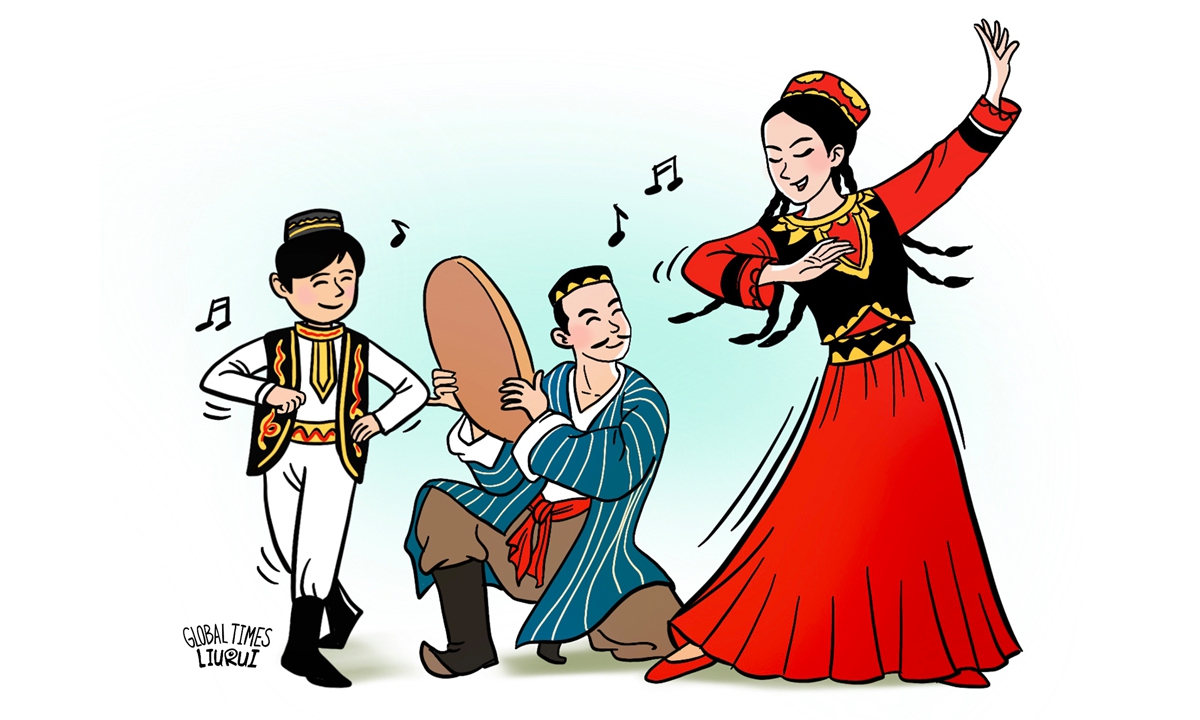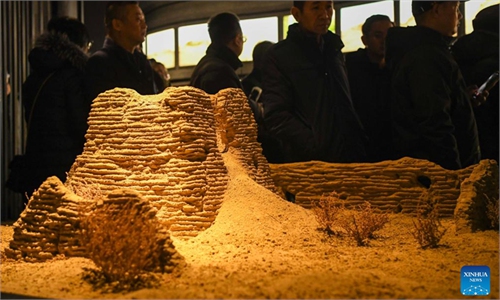
Illustration: Liu Rui /GT
In China, Xinjiang is known for being a beautiful, vast, vibrant place. However, in Western media reports, Xinjiang is described as a dangerous place with human rights and forced labor issues for ethnic minorities. Recently, I had the opportunity to visit Xinjiang and was amazed to find that Xinjiang is much more prosperous than I had imagined based on articles and reports. It is easy to sense the social stability, harmony and rapid economic development through the lives and stories of Xinjiang residents."No matter what ethnicity, we are one family." This statement comes from a couple living on the Xishan Farm in Urumqi City, Northwest China's Xinjiang Uygur Autonomous Region. The wife, named Mian Lisha, is of the Hui ethnic group, while the husband, named Asat Ahmet, is of the Uygur ethnic group. This young couple told me that they have a large family consisting of eight people from five different ethnic groups. In their community, it is common for a family to include multiple ethnicities.
"Although our family relationships are complex, I have always felt the love and harmony of a multi-ethnic family," Mian told me. Having a multi-ethnic family, Mian and Asat used to worry about the difficulty of integrating the lifestyles of both families. However, after nine years of living together, Mian has learned about the Uygur language, and Asat has adapted to Hui-style cuisine. Most importantly, they celebrate the most important festivals of both the Hui and Uygur ethnicities, such as Eid al-Fitr for the Hui, Roza Festival for the Uygur, and the Spring Festival, together as a family.
Nowadays, both Mian and Asat work in the e-commerce industry. In their work, they are able to conduct live streaming and sell products fluently in Putonghua. Mian used to want to leave Xinjiang and work in a big city like Beijing or Shanghai. However, the development of Xinjiang ultimately made her decide to stay in her hometown. The couple believes that the development of internet technology and logistics in Xinjiang has provided a great opportunity for young people in Xinjiang to prosper in the e-commerce industry.
Another multi-ethnic family I met in Xinjiang is the family of a 61-year-old Hui woman named Li Caixia. Her family is a traditional Hui family. Three years ago, her daughter fell in love with a Uygur young man. Despite opposition from some older relatives due to their different ethnicities, Li did not think the same way. She told me, "I cannot oppose them because of their ethnicities, and I don't care about material things either. As long as my daughter loves him, I will agree to their marriage."
Today, multi-ethnic families and the harmonious coexistence of different ethnicities are common in Xinjiang. The Xishan Farm, where Mian and Li live, is home to over 50,000 people from 34 ethnic groups. According to a report from the Administrative Office of Tacheng Prefecture in Xinjiang in 2019, out of 330,000 households in the region, there are over 11,000 households that comprise two or more different ethnic groups. Some communities have around 20 percent multi-ethnic families. Xinjiang has been a multi-ethnic settlement area since ancient times, and people of different ethnicities living here have close interactions with each other. Different ethnic groups can live comfortably and harmoniously in the same family.
Over the years, some Western anti-China forces have falsely accused Xinjiang of "human rights violations" and "persecution of ethnic minorities." Behind these accusations lies the ideological bias of Western countries, driven by geopolitical and strategic needs. Since May last year, some German politicians and international human rights organizations have been hyping up the issue of "forced labor" in Volkswagen's Xinjiang factory. Recently, the Volkswagen Group, which has been slandered, issued a statement stating that an independent review commissioned by a human rights consulting firm found no signs or evidence of "forced labor." However, this answer has been coldly received in Western political and public opinion circles. This made me realize that some Western politicians who have been sitting arrogantly on their high horses have moved from arrogance to self-isolation. They refuse to see the true picture of Xinjiang.
The British essayist William Hazlitt once wrote that prejudice is the child of ignorance. Some Western politicians and media with ulterior motives refuse to accept the true voice of Xinjiang and treat lies as truth. Their absurd remarks make me doubt whether the Xinjiang they talk about and the Xinjiang I have seen are the same place.
I visited Xinjiang during the snowy season, which is the peak time for ice-and-snow tourism in the region. I was deeply impressed by the happiness and smiling faces of both the local people and tourists enjoying the snow. I learned that during the 2022-2023 ice and snow season, Xinjiang's S-class ski resorts generated tourism revenue of 229 million yuan ($32.04 million), attracting more than 200 million tourists. Currently, the most popular winter tourist attraction in Xinjiang is Hemu Village in Burqin County, Altay Prefecture, where the per capita net income exceeds 40,000 yuan ($5,598). 10 years ago, the per capita income in this traditional pastoral village was only around 10,000 yuan ($1,399).
If Xinjiang, which is now thriving with tourists and experiencing economic development, and where people are enjoying harmony between different ethnic groups, needs Western politicians' "support" for human rights, then where is their support for the people in the war-torn Gaza Strip, which is full of devastation?
The people of Xinjiang have the final say over their human rights. Western anti-China forces use the so-called "human rights violations" as an excuse to accuse Xinjiang of "cultural genocide" and "ethnic genocide," hoping to undermine the unity of various ethnic groups in Xinjiang, but this is wishful thinking. I believe that in Xinjiang, there will be more multi-ethnic families like Mian's and Li's family who believe that "every ethnic group is Chinese."
The author is a reporter with the Global Times. qianjiayin@globaltimes.com.cn

